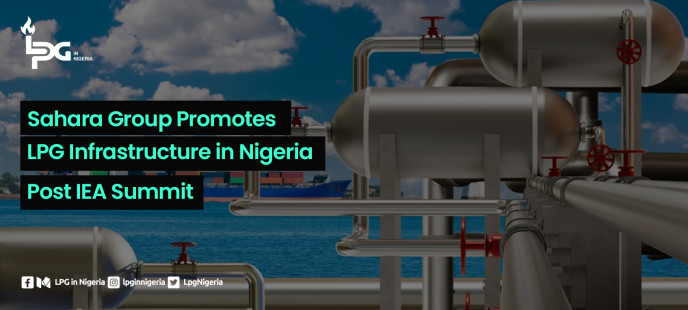- 3740
- 0
Sharing Ideas and Updates on LPG in Nigeria and related information to enable effective collaboration within the LPG Value Chain
Sahara Group Promotes LPG Infrastructure In Nigeria Post IEA Summit

At LPG in Nigeria, we are dedicated to promoting sustainable energy solutions that address the pressing needs of our communities. This commitment resonates strongly with the recent advocacy by the Sahara Group at the International Energy Agency (IEA) summit on clean cooking in Africa, held in Paris. The key takeaway? Investment in infrastructure and stakeholder collaboration is crucial for the widespread adoption of clean cooking solutions across the continent.
The Infrastructure Imperative
A significant barrier to the adoption of Liquefied Petroleum Gas (LPG) in Africa is the lack of adequate storage infrastructure. This shortfall forces many regions to depend heavily on imports and shipping, which is neither sustainable nor efficient. CITAC projects that by 2035, the demand for LPG in Sub-Saharan Africa will nearly triple from current levels. This anticipated surge in demand highlights the urgent need for robust infrastructure to support and sustain this growth.
Setting Ambitious Targets
Regional economic blocs in Africa, supported by the World Bank, have set ambitious targets for LPG penetration and consumption. The goal is to achieve near-exclusive LPG usage for cooking by 2030. However, reaching these targets requires comprehensive policy alignment, infrastructure development, and strategic investments.
The Power of Public-Private Partnerships
Ijeoma Isichei, the Head of Business Development (Gas) at Sahara Group, underscored the necessity for industry-led expansion programs, support from developed economies, and well-established public-private partnerships (PPPs). She emphasized that enhancing LPG infrastructure is crucial to making clean cooking accessible and affordable for all.
Sahara group emphasised the believe in the transformative power of collaboration. A prime example of successful PPP is the partnership between Sahara Group and Petroci, Cote d'Ivoire’s national oil and gas company. This collaboration focuses on constructing 12,000MT LPG storage facilities in Cote d'Ivoire, a project made possible through the combined efforts of government bodies, private sectors, and support from development agencies such as WAGL Energy Limited and the Nigerian National Petroleum Company Limited (NNPCL).
LPG in Nigeria’s Observation of the Future
Looking ahead, our focus remains on fostering similar partnerships and advocating for policies that promote environmental sustainability and economic growth. The journey towards widespread adoption of clean cooking solutions is challenging but achievable. It requires a unified approach, leveraging the strengths and resources of both public and private entities.
At LPG Nigeria, we are committed to playing our part in this transformative journey. By investing in infrastructure, advocating for supportive policies, and fostering strategic partnerships, we can help ensure that clean, sustainable cooking solutions become a reality for millions of households across Africa.
Together, we can create a future where clean cooking is not a privilege but a standard, contributing to better health, economic development, and environmental sustainability for our continent. Let’s embrace this future with optimism and determination.
















0 Comment.